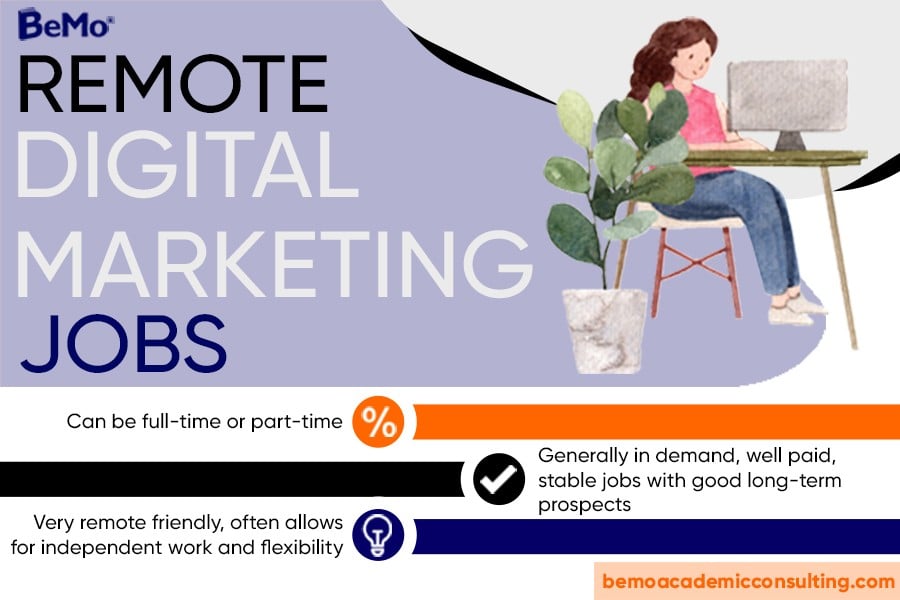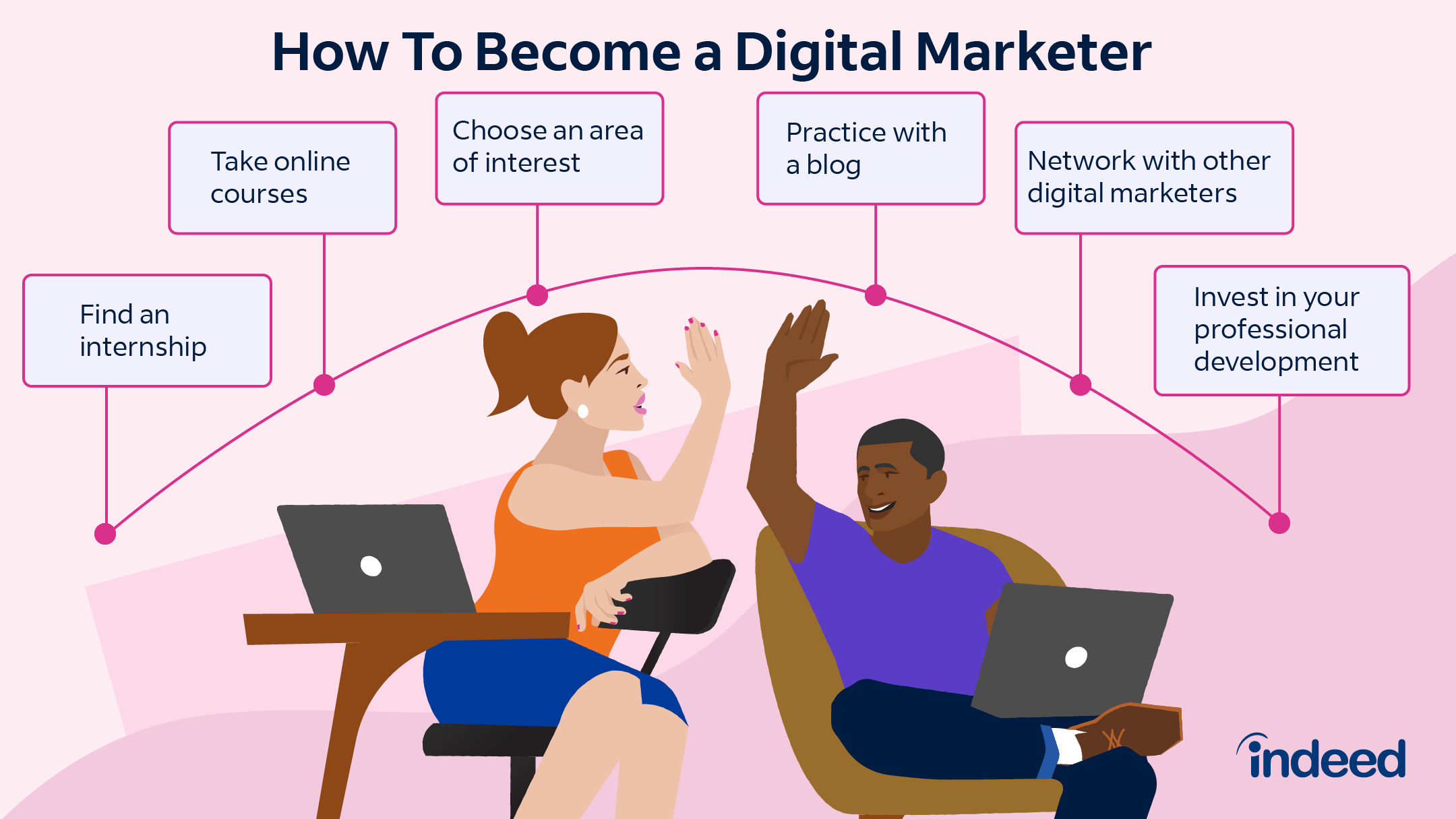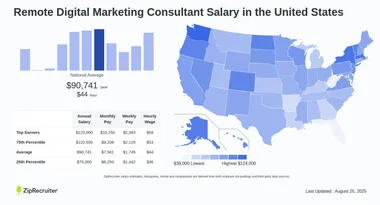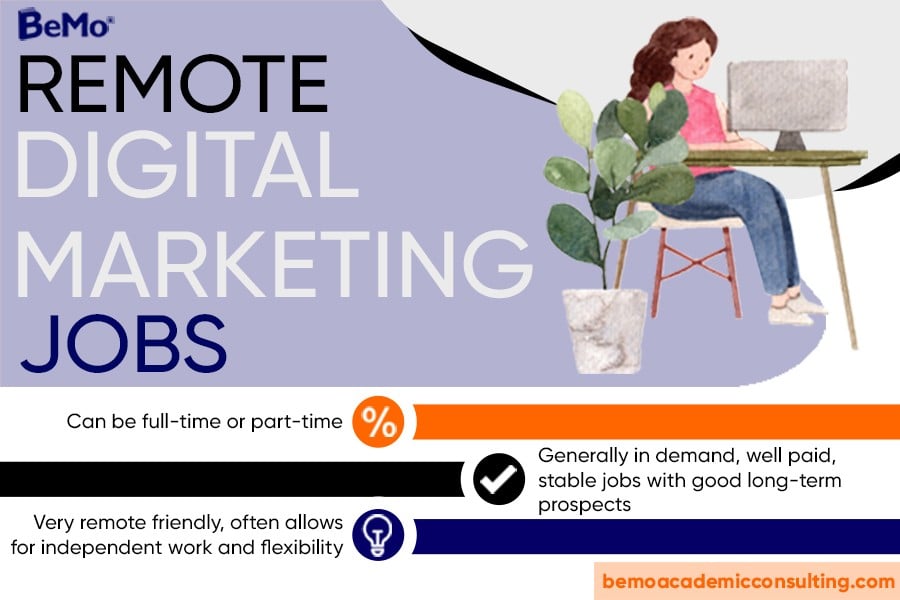- How to Land a Remote Job in Digital Marketing
- Can digital marketing be a remote job?
- How can I become a digital marketer from home?
- How much does a remote digital marketer make?
-
Is it hard to find a job in digital marketing?
- What Factors Influence the Difficulty of Finding a Job in Digital Marketing?
- What Skills Are Most in Demand for Digital Marketing Jobs?
- How Does Experience Impact Job Opportunities in Digital Marketing?
- What Are the Entry-Level Challenges in Digital Marketing?
- How Can Certifications Improve Your Chances in Digital Marketing?
- Frequently Asked Questions from Our Community
The digital marketing industry has seen a significant shift towards remote work, offering professionals the flexibility to work from anywhere in the world. Securing a remote job in this field requires a combination of technical skills, strategic networking, and a strong online presence. Whether you're a seasoned marketer or a newcomer, understanding the tools, platforms, and trends in digital marketing is essential. Additionally, showcasing your expertise through a well-crafted portfolio and leveraging job platforms tailored for remote opportunities can set you apart. This article explores actionable steps to help you navigate the competitive landscape and land a remote role in digital marketing.
How to Land a Remote Job in Digital Marketing
Landing a remote job in digital marketing requires a combination of skills, experience, and a strategic approach to job searching. With the rise of remote work, many companies are now offering opportunities for digital marketers to work from anywhere. Below, we break down the steps to help you secure a remote position in this competitive field.
See Also Which marketing career path is most sustainable?
Which marketing career path is most sustainable?1. Build a Strong Digital Marketing Skill Set
To stand out in the digital marketing job market, you need to master essential skills such as SEO, content marketing, social media management, email marketing, and data analytics. Consider taking online courses or certifications from platforms like Google Analytics Academy, HubSpot Academy, or Coursera to enhance your expertise. Employers often look for candidates who can demonstrate proficiency in these areas.
| Skill | Importance |
|---|---|
| SEO | High |
| Content Marketing | High |
| Social Media Management | Medium |
| Email Marketing | Medium |
| Data Analytics | High |
2. Create a Portfolio Showcasing Your Work
A strong portfolio is crucial for proving your capabilities to potential employers. Include examples of successful campaigns, content you’ve created, and analytics reports that highlight your impact. If you’re new to the field, consider working on freelance projects or volunteering to build your portfolio. Platforms like Behance or LinkedIn can help you showcase your work effectively.
See Also What are the most important hard and soft skills for marketing success?
What are the most important hard and soft skills for marketing success?3. Network with Industry Professionals
Networking is key to finding remote job opportunities. Join digital marketing communities on platforms like LinkedIn, Facebook, or Slack. Attend virtual webinars, conferences, and workshops to connect with industry professionals. Building relationships can lead to job referrals or insider information about remote job openings.
4. Tailor Your Resume and Cover Letter for Remote Roles
When applying for remote jobs, emphasize your ability to work independently, manage time effectively, and communicate clearly. Highlight any previous remote work experience or freelance projects. Use keywords like remote collaboration, self-motivated, and results-driven to align your application with the job description.
See Also Is HubSpot Worth It as a CRM and Website CMS?
Is HubSpot Worth It as a CRM and Website CMS?5. Use Job Boards Specializing in Remote Work
Focus your job search on platforms that specialize in remote opportunities. Websites like We Work Remotely, Remote.co, and FlexJobs often list remote digital marketing roles. Additionally, filter job searches on general platforms like Indeed or LinkedIn using keywords like remote, work from home, or digital marketing.
| Job Board | Specialization |
|---|---|
| We Work Remotely | Remote Jobs |
| Remote.co | Remote Jobs |
| FlexJobs | Remote and Flexible Jobs |
| Indeed | General Job Board |
| Professional Networking |
Can digital marketing be a remote job?

 What Do Digital Marketers Exactly Do? What Does a Workday Look Like?
What Do Digital Marketers Exactly Do? What Does a Workday Look Like?Is Digital Marketing Suitable for Remote Work?
Yes, digital marketing is highly suitable for remote work due to its nature of being internet-based. Most tasks, such as managing campaigns, analyzing data, and creating content, can be performed from anywhere with a reliable internet connection. Here are some reasons why:
- Flexibility: Digital marketers can work from home, co-working spaces, or even while traveling.
- Tools and Platforms: Most digital marketing tools, like Google Analytics, Hootsuite, and Canva, are cloud-based and accessible remotely.
- Global Opportunities: Remote work allows marketers to collaborate with clients and teams worldwide.
What Digital Marketing Roles Can Be Done Remotely?
Many roles within digital marketing are well-suited for remote work. These roles often require minimal physical presence and rely heavily on digital tools. Here are some examples:
- Social Media Manager: Manages social media accounts, schedules posts, and engages with audiences online.
- SEO Specialist: Optimizes websites for search engines and analyzes performance metrics remotely.
- Content Creator: Writes blogs, designs graphics, and produces videos from any location.
What Tools Are Essential for Remote Digital Marketing?
To succeed in remote digital marketing, professionals rely on a variety of tools to streamline their work. These tools ensure efficiency and collaboration. Key tools include:
- Project Management: Tools like Trello, Asana, or Monday.com help organize tasks and deadlines.
- Communication: Platforms like Slack or Microsoft Teams facilitate team collaboration.
- Analytics: Google Analytics and SEMrush provide insights into campaign performance.
What Are the Challenges of Remote Digital Marketing?
While remote digital marketing offers many benefits, it also comes with challenges. These can impact productivity and communication. Common challenges include:
- Time Zone Differences: Coordinating with global teams can be difficult due to varying work hours.
- Distractions: Working from home may lead to interruptions from family or household tasks.
- Technical Issues: Reliance on internet connectivity and software can sometimes cause delays.
How to Stay Productive in Remote Digital Marketing?
Maintaining productivity in remote digital marketing requires discipline and effective strategies. Here are some tips to stay on track:
- Set a Schedule: Establish consistent working hours to create a routine.
- Use Time Management Tools: Tools like Toggl or RescueTime can help track and optimize work hours.
- Create a Dedicated Workspace: A quiet, organized space can improve focus and efficiency.
How can I become a digital marketer from home?

1. Understand the Basics of Digital Marketing
To become a digital marketer from home, start by understanding the fundamentals of digital marketing. This includes learning about various channels such as SEO, social media marketing, email marketing, and content marketing. Familiarize yourself with key concepts like target audiences, analytics, and conversion rates. You can begin by:
- Taking online courses from platforms like Coursera, Udemy, or HubSpot Academy.
- Reading blogs and ebooks from industry leaders like Neil Patel or Moz.
- Watching tutorials and webinars on YouTube or LinkedIn Learning.
2. Build a Strong Online Presence
Your online presence is crucial as a digital marketer. Start by creating a professional website or blog to showcase your skills and knowledge. Use social media platforms like LinkedIn, Twitter, and Instagram to network and share valuable content. Steps to build your online presence include:
- Optimizing your LinkedIn profile with relevant keywords and a detailed work history.
- Creating and sharing engaging content regularly on your blog or social media.
- Participating in online communities and forums related to digital marketing.
3. Gain Practical Experience
Practical experience is essential to becoming a successful digital marketer. Start by working on personal projects or offering your services to small businesses or non-profits. This will help you build a portfolio and gain hands-on experience. Consider the following steps:
- Offer free or discounted services to friends, family, or local businesses.
- Create mock campaigns to practice different digital marketing strategies.
- Use freelance platforms like Upwork or Fiverr to find small projects.
4. Master Digital Marketing Tools
To excel as a digital marketer, you need to be proficient in various digital marketing tools. These tools help in analyzing data, managing campaigns, and automating tasks. Some essential tools to learn include:
- Google Analytics for tracking website performance.
- Hootsuite or Buffer for managing social media accounts.
- Mailchimp or Constant Contact for email marketing campaigns.
5. Stay Updated with Industry Trends
Digital marketing is a fast-evolving field, and staying updated with the latest trends is crucial. Follow industry news, attend webinars, and join professional groups to keep your knowledge current. Here’s how you can stay informed:
- Subscribe to digital marketing newsletters like MarketingProfs or Search Engine Journal.
- Follow industry influencers on social media and read their blogs.
- Attend virtual conferences and workshops to learn about new tools and strategies.
How much does a remote digital marketer make?

Average Salary of a Remote Digital Marketer
The average salary of a remote digital marketer varies depending on factors such as experience, location, and industry. On average, a remote digital marketer can earn between $50,000 and $80,000 per year. However, highly experienced professionals or those working in specialized fields can earn upwards of $100,000 annually.
- Entry-level remote digital marketers typically earn between $40,000 and $55,000 per year.
- Mid-level professionals with 3-5 years of experience can expect salaries ranging from $55,000 to $75,000 annually.
- Senior-level digital marketers with over 5 years of experience often earn between $75,000 and $100,000 or more.
Factors Influencing a Remote Digital Marketer's Salary
Several factors influence how much a remote digital marketer earns. These include their skill set, certifications, and the demand for their expertise in the market.
- Experience: More experienced marketers command higher salaries.
- Certifications: Holding certifications like Google Ads or HubSpot can increase earning potential.
- Industry: Certain industries, such as tech or finance, tend to pay higher salaries for digital marketing roles.
Geographic Impact on Remote Digital Marketer Salaries
While remote work allows for flexibility, the geographic location of the employer or the marketer can still impact salary. Companies based in high-cost-of-living areas often pay more, even for remote roles.
- U.S.-based companies typically offer higher salaries compared to companies in other regions.
- Global companies may adjust salaries based on the cost of living in the employee's country.
- Freelance rates can vary widely depending on the client's location and budget.
Freelance vs. Full-Time Remote Digital Marketer Earnings
Freelance remote digital marketers often have different earning structures compared to full-time employees. Freelancers charge hourly or project-based rates, which can lead to higher or lower earnings depending on their workload and client base.
- Hourly rates for freelance digital marketers range from $25 to $150, depending on expertise.
- Project-based earnings can vary significantly, with some projects paying $1,000 or more.
- Full-time employees benefit from consistent salaries and additional perks like health insurance and paid time off.
Specializations That Increase Earnings for Remote Digital Marketers
Certain specializations within digital marketing can significantly boost a remote marketer's earning potential. These include areas like SEO, PPC, and data analytics.
- SEO Specialists can earn between $60,000 and $90,000 annually.
- PPC Experts often command salaries ranging from $65,000 to $95,000 per year.
- Data Analysts in digital marketing can earn upwards of $80,000, especially if skilled in tools like Google Analytics and Tableau.
Is it hard to find a job in digital marketing?

What Factors Influence the Difficulty of Finding a Job in Digital Marketing?
Finding a job in digital marketing depends on several factors, including your skillset, experience, and the demand in your region. Here are some key points to consider:
- Skillset: Proficiency in areas like SEO, content creation, and data analytics increases your chances.
- Experience: Employers often prefer candidates with hands-on experience or a strong portfolio.
- Market Demand: Urban areas with a high concentration of businesses tend to have more opportunities.
What Skills Are Most in Demand for Digital Marketing Jobs?
Digital marketing roles require a mix of technical and creative skills. Here are the most sought-after skills:
- SEO and SEM: Expertise in search engine optimization and marketing is highly valued.
- Data Analytics: Ability to interpret data and measure campaign performance is crucial.
- Content Creation: Strong writing and design skills are essential for creating engaging content.
How Does Experience Impact Job Opportunities in Digital Marketing?
Experience plays a significant role in securing a job in digital marketing. Employers often look for candidates who can demonstrate:
- Proven Results: A track record of successful campaigns or projects.
- Industry Knowledge: Familiarity with tools like Google Analytics, HubSpot, or SEMrush.
- Adaptability: Ability to stay updated with the latest trends and technologies.
What Are the Entry-Level Challenges in Digital Marketing?
Starting a career in digital marketing can be challenging due to:
- Competition: High number of applicants for entry-level positions.
- Skill Gaps: Lack of practical experience or certifications.
- Networking: Limited professional connections in the industry.
How Can Certifications Improve Your Chances in Digital Marketing?
Certifications can significantly enhance your employability by showcasing your expertise. Consider the following:
- Google Ads Certification: Validates your knowledge of paid advertising.
- HubSpot Content Marketing Certification: Demonstrates your content strategy skills.
- Facebook Blueprint: Proves your ability to manage social media campaigns effectively.
Frequently Asked Questions from Our Community
What skills are needed to land a remote job in digital marketing?
To secure a remote job in digital marketing, you need a combination of technical and soft skills. Key technical skills include proficiency in SEO (Search Engine Optimization), content creation, social media management, data analytics, and familiarity with tools like Google Analytics, HubSpot, or SEMrush. Additionally, understanding paid advertising platforms such as Google Ads and Facebook Ads is crucial. On the soft skills side, employers look for strong communication, time management, and self-discipline, as remote work requires you to stay productive without direct supervision.
How can I build a portfolio for a remote digital marketing job?
Building a portfolio is essential to showcase your expertise to potential employers. Start by working on personal projects, such as creating a blog, managing social media accounts, or running small ad campaigns. You can also offer freelance services or volunteer for non-profits to gain real-world experience. Include case studies that highlight your achievements, such as increasing website traffic, improving conversion rates, or optimizing ad spend. Use platforms like LinkedIn, Behance, or a personal website to display your work and make it easily accessible to recruiters.
Where can I find remote digital marketing job opportunities?
There are several platforms and resources to find remote digital marketing jobs. Popular job boards like LinkedIn, Indeed, and Glassdoor often list remote opportunities. Specialized websites such as We Work Remotely, Remote.co, and FlexJobs focus exclusively on remote roles. Additionally, networking on platforms like LinkedIn or attending virtual industry events can help you connect with employers. Don’t forget to check the career pages of companies you admire, as many now offer remote positions.
How do I prepare for a remote digital marketing job interview?
Preparing for a remote digital marketing job interview involves both technical and logistical readiness. Research the company and its marketing strategies to demonstrate your interest and knowledge. Be ready to discuss your portfolio and provide specific examples of your achievements. Practice answering common interview questions, such as how you handle remote collaboration or manage multiple projects. Ensure your technology is set up properly, including a reliable internet connection, a quiet space, and a professional background for video calls. Finally, prepare thoughtful questions to ask the interviewer about the role and company culture.
Leave a Reply


Articles of interest